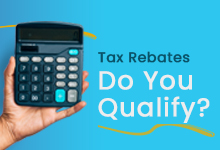
“The hardest thing in the world to understand is the income tax.” (Albert Einstein)
Tax rebates, deductions and incentives provide relief to taxpayers by reducing the amount of tax payable to SARS, resulting in welcome tax savings. But how do you figure out which rebates, deductions or incentives apply to you – and what’s the procedure for claiming them?
This is where we come in. Chances are we’ve already applied a number of these rebates, deductions or incentives to your tax returns. But here’s a list of some of the tax rebates, deductions and incentives that could make a substantial difference to your SARS bill for the 2024 Tax Season. Some of them are fairly wellknown, but others are pretty obscure.
If you think you qualify for additional rebates, deductions or incentives, please do get in touch. We are committed to ensuring that you don’t pay more tax than you should.
For individuals
- Tax threshold: You only start paying tax when you earn more than R95,750 (under 65 years); or R148,217 (65 – 75 years); or R165,689 (75 and older).
- Tax rebates: Taxpayers also qualify for a R17,235 primary rebate; an additional secondary rebate of R9,444 if over 65, and a further tertiary rebate of R3,145 if over 75.
- Medical tax credits for medical scheme contributions can be deducted from your tax payable at R364 each per month for you and your first dependent, and R246 for each subsequent dependant.
- The additional medical expenses tax credit allows qualifying out-of-pocket medical expenses to be deducted from the normal tax payable. This applies to medical expenses that were not recovered from your medical aid.
- Retirement fund contributions to a locally-registered pension, provident, or retirement annuity fund are deductible subject to certain maximum limits.
- Amounts received/accrued from tax-free investments are exempt from tax, subject to limitations.
- Donations to certain approved public benefit organisations are allowed as deductions, up to a maximum of 10% of taxable income.
- A solar energy tax credit of 25% of the cost of the solar PV panels (maximum R15,000) is available for new and unused solar PV panels acquired and used for the first time between 1 March 2023 to 29 February 2024.
- Home office expenditure: Employees who have a dedicated area used regularly and exclusively for “trade” in their home may be allowed to deduct, pro-rata, certain expenses like rent, repairs, utilities, phones and internet.
- The foreign tax credit is a rebate against income tax for foreign taxes paid on foreign-sourced income.
- Taxpayers carrying on a business in their individual capacity or in partnership may deduct business expenditure or losses on the same basis as companies.
For businesses
- Tax relief measures for small business corporations (SBCs) allows for a progressive tax rate, immediate write-off of new plant or machinery, and a wear-and-tear or accelerated allowance on depreciable assets.
- Tax relief for qualifying micro businesses involves a simplified turnover tax, instead of the usual taxes (income tax, provisional tax and Capital Gains Tax) payable by companies.
- Energy efficiency savings incentive provides a deduction for savings from implementing energy-efficient methods in the production of income at R0.95 for each kilowatt hour (or equivalent) saved.
- The redesigned renewable energy tax deduction for certain machinery, plant, implements, utensils and articles used in production of renewable energy allows a 125% deduction of the cost incurred for eligible assets brought into use for the first time between 1 March 2023 and 28 February 2025. Machinery, plant, implements, utensils and articles used in production of renewable energy outside of the above-mentioned period may qualify for a separate deduction (which allows a 100% deduction of costs incurred).
- Research and development (R&D) costs related to certain R&D activities are 150% deductible, while depreciation on R&D machinery and capital assets may be accelerated and buildings used in R&D may be written-off over 20 years.
- The learnership agreements tax incentive allows employers that train employees in a regulated environment an additional income tax deduction. (This is not the same as the Employment Tax Incentive (ETI) that encourages the employment of young people by reducing employees’ tax due by the company).
- Donations to certain charitable organisations approved as public benefit organisations are tax deductible, up to a maximum of 10% of taxable income.
- A depreciation (wear and tear) allowance may be deducted on movable assets used for the purpose of trade. There’s also an allowance for assets disposed of or scrapped during a year of assessment.
- Interest expenses incurred in the production of non-exempt income and for the purposes of trade are generally deductible.
- Bad debts are tax deductible under certain circumstances and a tax allowance is also provided for doubtful debts.
- The foreign tax credit is a rebate against income tax for foreign taxes paid on foreign-sourced income or a deduction against income of foreign taxes paid on SA-sourced income.
- There’s an allowance for new commercial buildings or improvements used by a business during the assessed year, equal to 5% of the cost to the taxpayer.
- There’s an allowance for certain residential units, equal to 5% of the cost to a taxpayer of new units or improvements.
- Deductions in respect of erection or improvement of buildings in Urban Development Zones have been extended until 31 March 2025.
- A Special Economic Zones (SEZ) incentive in certain SEZs includes a reduced corporate tax rate of 15%; a 10% allowance on the cost of new buildings or improvements; and an employees’ tax reduction for the employer by virtue of the ETI (with SEZs eligible for the ETI to apply irrespective of the employee’s age).
Tip of the iceberg
These are just some of the tax rebates, deductions or incentives available to taxpayers. Our expertise in correctly identifying and applying the relevant rebates, deductions or incentives to your tax matters can significantly reduce your tax burden this tax season.



